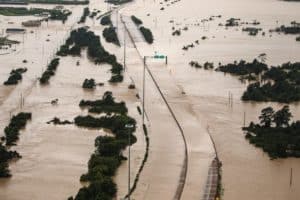
Houston flooding during Hurricane Harvey
Credit: Marcus Yam/Getty
When Hurricane Harvey’s record-busting rains drenched Texas in August 2017, they triggered a cascade of chaos. Widespread flooding turned roads into rivers, impeding evacuations and access to emergency services. Stormwater swept up pathogens from wastewater treatment plants and toxins from Superfund sites, posing health threats. Phone and internet services failed in some areas, and 300,000 people in Texas lost power. Harvey also temporarily shut down a quarter of U.S. oil production in the Gulf of Mexico, raising gas prices.
Such scenarios—climatic events causing impacts that can themselves trigger still more chains of effects, like intersecting rows of toppling dominoes—are a key focus of the fourth National Climate Assessment(NCA), released by the U.S. federal government at the end of November. For the first time, the 300 government, academic and nonprofit experts who contribute to the report devoted an entire chapter to the under-studied but critical interaction between climate change and what are called complex systems.
The report emphasizes that scientists need to look not only at how […]











